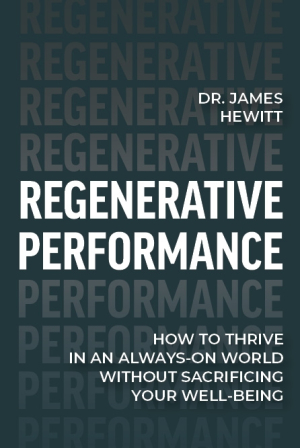Regenerative Performance
How to Thrive in an Always-On World Without Sacrificing Your Well-Being
Avoiding easy answers, the wellness guide Regenerative Performance encourages the thoughtful pursuit of sustainable practices.
James Hewitt’s health guide Regenerative Performance addresses misconceived but popular well-being methods and suggests alternatives based on scientific evidence.
Drawing on personal disillusionment following a rigorous but failed athletic program, the book argues that the systems people rely upon to fix their shortcomings, including fad diets, are often themselves flawed. Still, it says the failures of such systems are often attributed to “user error” by fitness gurus, business leaders, and diet experts. It calls such blame erroneous and shares questionnaires related to habits and mindsets to help people tailor its proposed alternatives to their own lives.
Most of the chapters deconstruct urban myths about fitness and well-being, naming logical flaws and using research data to support different conclusions. Some of the studies show gurus changing their own minds about their methods, while others address what seem like commonsense recommendations, such as avoiding stress: Some stress, it is suggested, can be healthy. Extreme examples of applying popular advice, as by hustling or quitting, are also included. Between ends of the spectrum, each chapter seeks a middle, personalized, way, achieved through surveys to discover how one eats, sleeps, and exercises in daily life.
The book’s organization mirrors its advice about how to avoid the pitfalls of the cure-alls by considering all sides before arriving at a final perspective. It includes memorable phrases like “the beginner mind” (curiosity paired with discernment) to capture the lifelong pursuit of personal wellness. In avoiding easy answers, it encourages the thoughtful pursuit of sustainable practices.
Drawing on scientific research but also reflecting Hewitt’s personal preferences, this user-friendly text effectively surveys a variety of buy-in, one-size-fits-all approaches to show that all-or-nothing plans fit no one. Further, it demonstrates ways to discover and trust one’s own path with clarity. Illustrations of chemicals interacting in the brain and hormonal cycles are present to support some of the book’s scientific points.
But as the names for various extreme approaches to stress, work-home balance, and sleep proliferate, the prose becomes jumbled with identifiers. Further, the bold-print headings, use of italics for emphasis, and bullet-point chapter summaries entice the eye and discourage reading the full text, running counter to internal encouragements toward learning through patience. And the book’s record-keeping tools do not contain enough room for all of the feedback they encourage.
Neither buying into self-help trends nor giving up on self-improvement altogether, the knowledgeable health guide Regenerative Performance is about choosing a wellness program based on an individual’s profile.
Reviewed by
Mari Carlson
Disclosure: This article is not an endorsement, but a review. The publisher of this book provided free copies of the book and paid a small fee to have their book reviewed by a professional reviewer. Foreword Reviews and Clarion Reviews make no guarantee that the publisher will receive a positive review. Foreword Magazine, Inc. is disclosing this in accordance with the Federal Trade Commission’s 16 CFR, Part 255.

